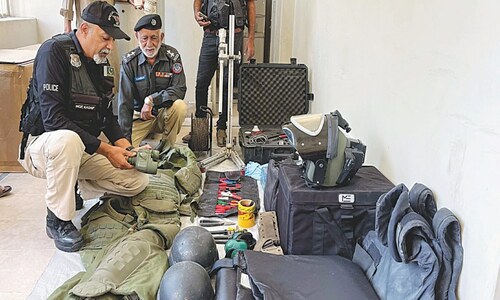KARACHI, Jan 14: Life in Karachi came to another halt on Monday in response to a strike call given by the Shia Ulema Council (SUC) across Sindh against the Quetta carnage and city-wide sit-ins that kept the main city roads and railway tracks blocked for a second consecutive day, suspending vehicle movement and departure and arrival of trains for almost 20 hours.
The city had remained shut on Sunday also on an appeal by the Muttahida Qaumi Movement on the same issue.
The city started returning to life in the second half of the day when more than 80 victims of the Quetta bombing were buried after a three-day sit-in on Alamdar Road in the Balochistan capital and asked the organisations in Karachi to call off their protests, mainly led by the Majlis-i-Wahdat-i-Muslimeen (MWM) that also supported the Monday strike call.
Although the fuel stations and retail markets in residential areas resumed business in the evening, traffic remained thin on all major roads and commercial districts remained closed. Trade and transport bodies said they supported the strike call to condemn the brutality and to show sympathy with the victims’ families.
“In the evening we called Shia leaders, who thanked us for our support for the strike and allowed us to resume business after 3pm,” said Ateeq Meer of the Karachi Tajir Ittehad, a common platform of 350 wholesale and retail markets in the city.
“But business centres in district south, mainly housing wholesale markets, remained closed as salesmen and other staff could not make it to work due to the absence of public transport. I should say that 50 per cent of our businesses were affected.”
Similar were the views of Irshad Bukhari of the Karachi Transport Ittehad, who said most transporters preferred not to bring their buses on roads even after the protests were over.
“Buses were seen in the evening on some major routes such as Sharea Faisal, Shahrah-i-Pakistan and Rashid Minhas Road,” he said. “A large number of fuel stations had been closed since morning, which could be another factor that prevented transporters from bringing their vehicles on roads.”
In their statements, the SUC and MWM thanked the Karachiites for their support against terrorism, and regretted the inconvenience caused to them due to the 48-hour sit-ins in different parts of the city.
“It showed the unity of the people of Karachi against the brutality and their resolve against injustice regardless of their sects and beliefs,” said Maulana Nazir Abbas Taqvi of the SUC.
“The successful protest also gave a message to the authorities that the people of Karachi are united against terrorism and would raise their voice in the future also against injustice to any community or sect.”
The Shia leaders also condemned the ‘regrettable episode’ in the early hours of the day when some youths manhandled Sindh ministers Sharjeel Inam Memon and Pir Mazhar-ul-Haq when they tried to meet the protesters outside the Bilawal House.
“We condemn the incident and show disassociation with those who tried to sabotage the peaceful protest organised only to seek justice for the Quetta victims,” said the MWM spokesman, quoting senior leader Sadiq Raza Taqvi as saying. “Mr Taqvi made telephonic contacts with Mr Memon and Mr Haq and offered his apology to them for the unfortunate incident. He also felt sorry for the inconvenience caused to the Karachiites due to the sit-ins in different parts of the city and thanked every segment of society for making their protest a success.”
The spokesman said the protest sit-ins, held at 20 different points in the city, including the Numaish traffic intersection, Malir 15, Shahrah-i-Quaideen, Incholi, Landhi, Safoora Goth, Johar Morr, Korangi Road, the airport, Orangi Town and Abbas Town, were called off simultaneously after Zohrain prayers.
Pillion-riding ban lifted
The Sindh government later in the evening removed the ban on pillion-riding in less than 24 hours of its imposition on Sunday night. Cellphone service suspended across the city was also restored around noon.
The officials said the pillion-riding was banned and cellphone service suspended following intelligence reports suggesting the possibility of terrorist activities aiming at protest demonstrations in the city.














































Dear visitor, the comments section is undergoing an overhaul and will return soon.